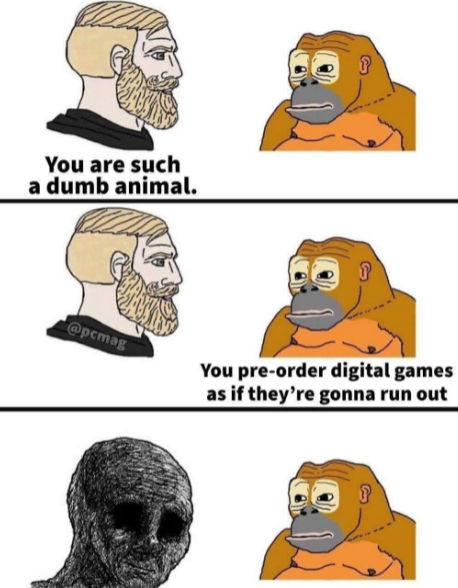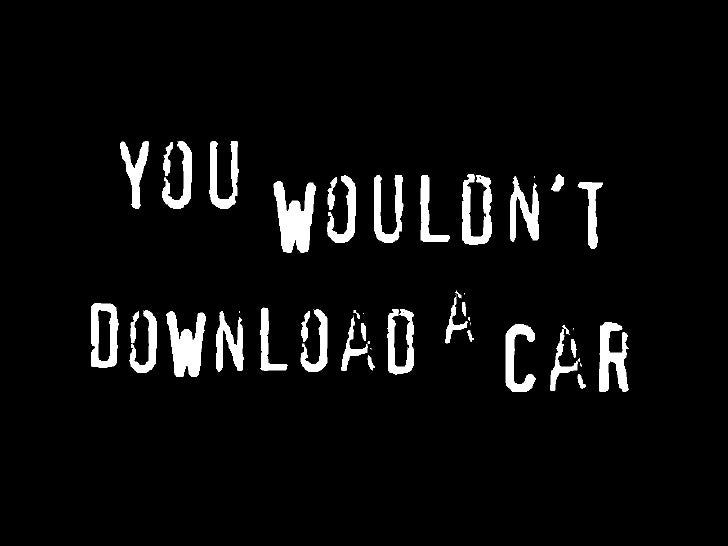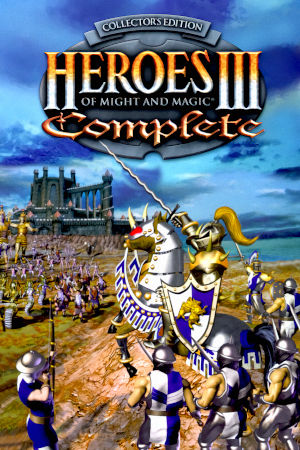
When you bought a 60$ videogame, back in the day, you paid partly for the cost of factory packaging.
But why do videogames still cost 60$, when they are sold digitally?
 Manufacturing CDs&their cases, and their movement on warehouses and stores isn't free.
Manufacturing CDs&their cases, and their movement on warehouses and stores isn't free.
Why does something which has no scarcity and can be replicated infinitely, have any monetary value?
For example, let's say you buy a car. If you could make the car once, and then copy-paste it without any effort, would any have car their current monetary value? Obviously not. If you paste them infinitely, and anyone can have a car for free, not a single car has monetary value.

 Duplicating bytes is the same as stealing a car?
Duplicating bytes is the same as stealing a car?
Things get tricky in the digital realm, compared to our realm. Why? Because for something to have value, it must have scarcity. This is partly why money used to be backed by gold and silver. If you can get something without effort; copy-pasting cars, buildings, objects, these objects have almost no monetary value, since anyone can have them. Why would you pay them?
And indeed, an "intellectual" would say a videogame can be described as bytes sequenced in a certain way, and these bytes are FREE (or more accurately, cheaper than water)
You can copy-paste bytes freely.
This is where copyright/IP laws come to protect the poor publishers. Protect, by crippling the technology. Banning the freedom to use your machine as it was naturally meant to be. To spread freely everything you treasure. Any knowledge or experience. Videogames, music, movies, doesn't matter. In the digital realm, you aren't limited to physical constraints, so this is possible.
This copyright/IP law literally goes against the laws of nature, because it cannot be enforced. It is a flawed law, as it says you do not own what you use in your computer, even though you actually do. Once a file enters your computer, you can do literally anything you can imagine. Duplicate it without any limit, or improve upon it. But copyright/IP laws say "if you do that, we will throw you to jail under the threat of a gun"
ok ok you have heard some of the above before, how does it relate to videogames?
The "golden age" of videogames, was literally some autists who had a vision, and they were given a budget to make it a reality.
What happened? Did they become extinct? No, not really. Some still exist, on obscure forums or ranting how bad videogames are. Most are simply struggling with real-life, money-wise or time-wise.
I will present a new market model for producing better videogames, food for thought.
It holds the ideal of a free market at its heart, more so than the current market.
- Every game is free to play (no microtransactions btw)
- Players pay money to the game developers only in the form of donations
Insane, it sounds, but I can explain it, by looking at the current model. A game costing 60$ or what other price, means you do not know what you are buying, until you play hours of it. Trailers and gameplay footage can never confirm if you will enjoy the game - if your purchase will be worth it. It is a mystery trade, you trade something definite, for something indefinite, something unknown.
It is not a trade, but a gamble.
"Not really, you can refund"
Refunds are a rare practice, and their requirements lie exclusively at the hands of the big stores (Valve/Epic etc etc), and as you can see from Bethesda, it is often abused.
Only Valve practices refunds properly, but even then it has so many problems.
A common example is buying a game on sale, playing it after a few months, uninstall within 5 minutes, yet you cannot refund.
A serious example is steam keys disabling refunding entirely...
The very concept of refunding is flawed, as it means you did a trade you feel was unjust and your money could be better spent elsewhere (refunding is a result of paying money for a random/misleading product)
For example you may have played 3 hours of a game in exchange of 60$, but gained only boredom, and that money could be spent on a better game. You should understand this if you play a boring lengthy rpg, then play some hype game which is finished in a few sessions, for far fewer $$$. The market had a better choice, yet more money went to a bad game than a good one (we_live_in_a_free_market.jpg etc etc)
With the above 2 guidelines, every game is free, but only the best games survive.
Random developer making yet another 2D platformer can release his game, but will earn nothing, as no one will donate to him. People will play his game, but since they felt they got no value, they will pay no value. Marketing will be less important as well, because profit will be made from the quality of the videogame instead of merely being convinced to try it out.
Why the above 2 guidelines? Because in this way, there are no copyright/IP laws, anyone can make the best game possible, in a truly free market, with the players paying for what they love, and hence, getting more of what they like. They can also get to keep their games and duplicate them, give them to friends and whatnot, hence, great games with little marketing can spread organically.
The Problem
You have already thought of it. The donation model is flawed. In a society where men are struggling to survive, and are so deep in debt that their chains reach even their unborn children, they have no money to spare. Look at the economic prosperity of today, middle-class is becoming extinct. Physical ownership is a fleeting dream. Cultural and social problems only get worse, everything degenerates.
Do you think someone will spend his last seeds of hope, into updating an autist's passion project by his good-will, or will he spend that money to improve himself?
There are other problems too, mainly the copyright/IP laws, which have been so long in action, that people self-censor themselves. People think ideas which are "consumed" (e.g. the setting of a videogame) are sacred by law (copyright). In short, culturally, it is normalized and accepted that it is illegal, EVIL to duplicate bytes or ideas. To share (copy-paste) your favourite videogame or movie.
"If you use this logo, you have to explicitly credit BigCorp™, no, ask for their consent to be 100% sure and have no trouble!"
There is also the concern of far less money being invested in the digital realm, since all products within are "free", and so they will be undervalued in comparison to physical products (which are obviously impossible to work on a free/donation model) I can explain this digital/physical comparison mindset with an example. When I know I can pay 10$ to play a masterpiece for 1 month straight, I refuse to spend 3$ for a coffee or 10$ for food outside, it is a disgusting use of my money/wealth. 10$ is equal to satisfy most of my day for a full month. Why would I spend 3$ for 1 hour of satisfaction? I feel robbed, so I don't do that unfair trade
Unfair to me, who has set such a high standard, because if someone hasnt played quality videogames or is just uninterested in them, it may seem fair The REAL arbiter of value everything is compared against.
The REAL arbiter of value everything is compared against.
Anyway, back on point to end this wall of text, I just wanted to express what I see as the ideal world for videogames, a world where anyone can enjoy videogames, movies, any digital media, "for free", and only the best prosper. The true benefit of the digital realm. But it is obvious this will never happen as long as there are laws enforcing ideas as ownership, laws claiming bytes in your computer are owned by corporations, censorship of speech is normalized, and other more serious things than those.
Good night, Utopia!